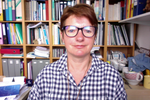
CHAVATTE-PALMER Pascale
- Biologie du Développement et Reproduction (BDR), INRA, Jouy en Josas, France
- Biotechnology, DOHaD - developmental origins of health and disease, Horses, Physiology, Reproduction, Reproductive and developmental biology, Veterinary science
- recommender
Recommendations: 0
Reviews: 0
Areas of expertise
Pascale Chavatte-Palmer graduated as DVM in France in 1989 and specialized in animal reproduction in UK, USA and France, with a research focus in placental and perinatal development in horses. In 1999, she joined the Biology of Development and Reproduction laboratory at INRA (National Institute of Agronomical Research in France) and studied the feto-placental and postnatal consequences of cloning and embryo technologies in cattle. In 2006, she started her own research group, developing domestic animal models of DOHaD, with an emphasis on placental function. Her group studies the effects of nutritional challenges, metabolic imbalance, embryo technologies and exposure to airborne and/or food pollutants, taking advantage of access to a large number of species and developing multidisciplinary approaches. She is currently president of the International Society for Embryo Technologies and spokesperson for the European Placental Group.